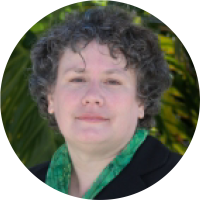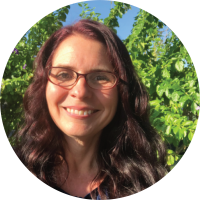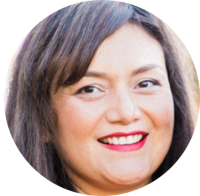FORP Facilitators Program
Facilitators are CSULB faculty who lead and facilitate faculty professional development workshops in partnership with ATS instructional designers, present on a variety of topics related to online teaching and share their expertise and experience.
Program Goal
The goal of the FORP Facilitator Program is to provide opportunities for faculty to present on selected topics related to FORP and engage with faculty who are attending the workshop. Their experiences and knowledge are shared with other faculty and the campus community at large.
Eligible Facilitators are expected to have:
- completed all three courses of the Faculty Online Teaching Program (FORP) series and have received the super badge.
- completed at least one of the Quality Matter’s certifications, such as APPQMR, IYOC, DYOC, or PRC.
- experience teaching an online, hybrid, or HyFlex class.
There are different tiers and roles that a facilitator can partake in. During this process, the facilitator partners with ATS and can present as a guest speaker, co-facilitator in a workshop, or serve as the main presenter and facilitator in a dedicated workshop.
- Collaborate and communicate regularly with an ATS instructional designer or co-facilitator to determine the design and delivery of the workshop.
- Prepare, rehearse, and practice the delivery of the engaging and interactive workshop, which may also include the technology setup tier.
- Present on the day/time of the workshop.
Can I sign up for more than one workshop/topic?
Based on your knowledge of the topic and your availability, you can sign up for more than one workshop.
What type of Facilitator roles are available?
- Guest Speaker
- Co-Facilitator
- Workshop Presenter
As a Facilitator, do I have the responsibility to answer participants' questions?
We strongly encourage Facilitators to engage with attendees and provide their expertise and insight to their colleagues during and at the end of the workshop.
Other than presenting, what are other Facilitator responsibilities?
Find the responsibilities of each type of Facilitator in our Faculty and ID Workshop Collaboration [PDF] document.
How long is a typical workshop?
FORP workshops typically run for one hour.
Is there a stipend provided for the facilitation of a workshop?
We offer a variety of stipends depending on the Facilitator role. Please refer to the Faculty and ID Workshop Collaboration [PDF] document for more information.
Become a Workshop Facilitator
In addition to offered stipend, faculty facilitators are subject to following benefits:
- Professional Development
Add facilitation to your CV as evidence of your leadership and management experience. - Leadership Experience
Hone critical leadership skills like managing groups, setting goals, and inspiring others. - Stay Current on Teaching Trends
Stay updated on current teaching strategies and technologies through research to prepare for workshops. Collaborating with fellow educators can help you gain fresh perspectives and refine your instructional techniques. - Contribution to the CSULB community
Become an active contributor to the CSULB community by sharing knowledge and expertise with fellow faculty. Your work can help enrich the learning environment - Personal Growth and Satisfaction
Challenge yourself; step out of your comfort zone to gain confidence and grow personally and professionally.

Teresa Zimmerman-Liu
Dr. Zimmerman-Liu is a lecturer of Asian Studies in the Department of Asian and Asian American Studies. She currently teaches online asynchronous courses for that department, and her Asian Films course is a QM (Quality Matters) certified course. She is also a QM master reviewer and a peer reviewer for CSULB's Faculty Online Readiness Program (FORP).
Sample Workshop: Online Instructional Techniques

Connie Ireland
Connie Ireland is a professor in the School of Criminology, Criminal Justice & Emergency Management (CCJEM), in the College of Health & Human Services (CHHS).
My research focuses on prison and parole, with a primary interest in the collateral consequences of incarceration for inmates and their families, those employed in the field, and on victims and communities. I am particularly interested in relationships in the context of incarceration, including relationships between inmates & their loved ones, and relationships/support systems for correctional workers.
I teach a variety of Quality Matters (QM)- and Service Learning (SL)- certified courses, including Corrections (QM), Ethics (QM), Probation & Parole, Get On The Bus (SL, bringing children to visit incarcerated parents), Social Justice in Action (SL) and Collateral Consequences of Incarceration.
Additionally, I am the current Chair (and prison representative) of the CSULB Institutional Review Board (IRB) for the protection of human subjects, and also the Faculty Fellow for Research for the College of Health and Human Services. I serve on various community boards, including the Board of Directors – Center For Restorative Justice Works (CRJW) and have received Certificates of Recognition from the California Legislature (2005), California State Senate (2005), and the U.S. House of Representatives (2005); Letters of Merit from the U.S. Department of Justice (2018) and Federal Bureau of Prisons (2018), and the Community Service Award for the College of Health & Human Services (2019). In 2016, I was given The President’s Award - Western Society of Criminology, and in 2023, I was recipient of The President's Awards for Outstanding Faculty Achievement at CSULB. As a first-generation college graduate, a wife/mother, and busy professional, I understand the challenge of juggling multiple demands. So rather than reinventing the wheel with course design, let’s collaborate together to share what works in leveraging pedagogical best practices in discipline-specific course content.
Sample Workshop: Accessibility and UDL

Dianna McCluskey
Dianna McCluskey has over twenty years of experience in local, state, and federal public service. Dianna is a Lecturer for the School of Criminology, Criminal Justice, and Emergency Management. Dianna has taught classes centered on studying Criminal Investigation, Criminology, the Criminal Justice System, Report Writing, and White-Collar Crime. Dianna is certified as a Beach Mentor, part of the Advancing Inclusive Mentoring (AIM) program on campus. She is committed to positive and inclusive mentoring.
Sample Workshop: Intro to Online Teaching and Learning
How the Facilitation Works
- If you are interested in collaborating with ATS and the instructional design team in becoming a workshop Facilitator, please fill out our Workshop Proposal Form. Indicate your topic, preferred date, time, and modality. In addition, please provide a brief description and title of your presentation.
- Once we receive your workshop proposal, you will be paired with an ATS Instructional Designer who will contact you to discuss the details. For further inquiries regarding workshop facilitation, please contact:
ats-instructionaldesign@csulb.edu.





